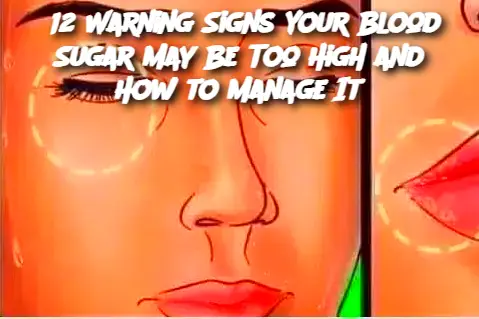ADVERTISEMENT
Introduction
High blood sugar, or hyperglycemia, occurs when the body can't properly regulate glucose levels, leading to a variety of symptoms that can affect your overall health. Understanding the signs of high blood sugar is key to taking action and preventing complications. In this article, we’ll explore 12 common signs that your blood sugar levels may be too high and offer practical tips for managing them. By recognizing these symptoms early and making necessary changes to your lifestyle, you can support your health and prevent long-term consequences of hyperglycemia.
1. Increased Thirst
When blood sugar is high, the kidneys work harder to filter excess glucose from the bloodstream. This can lead to dehydration, causing you to feel constantly thirsty.
2. Frequent Urination
Elevated blood sugar levels can make your kidneys filter more water, leading to an increased need to urinate. If you notice this happening more often than usual, it could be a sign your blood sugar is too high.
3. Fatigue
When your body can't use glucose effectively, you may feel tired or sluggish. Lack of energy is a common symptom of high blood sugar levels.
4. Blurred Vision
High blood sugar can cause fluids to be pulled from the lenses of the eyes, affecting your ability to focus and leading to blurred vision.
5. Headaches
Frequent headaches can be a sign of fluctuating blood sugar levels, as the brain depends on stable glucose levels for energy.
6. Unexplained Weight Loss
When your body can’t use glucose properly, it begins to break down muscle and fat for energy. This can result in unexplained weight loss, even if your appetite has increased.
7. Slow Healing of Wounds
High blood sugar can impair your body's ability to heal wounds. Cuts, bruises, or other injuries may take longer to recover than usual.
8. Increased Hunger
When blood sugar is high, the body might not be able to efficiently absorb glucose for energy, leading to an increase in hunger as the body craves fuel.
9. Nausea and Vomiting
In extreme cases, untreated high blood sugar can lead to nausea and vomiting, particularly when blood sugar levels remain elevated for long periods.
10. Dry Mouth and Skin
Dehydration from high blood sugar levels can leave you with a dry mouth and dry, itchy skin.
11. Tingling or Numbness in Hands and Feet
Neuropathy, or nerve damage, can occur due to prolonged high blood sugar, leading to sensations of tingling, numbness, or a "pins and needles" feeling, especially in the extremities.
12. Breath That Smells Fruity or Sweet
A distinct fruity or sweet-smelling breath could be a sign of diabetic ketoacidosis, a serious condition that occurs when high blood sugar leads to the breakdown of fat for energy. This requires immediate medical attention.
Ingredients for Blood Sugar Management
Balanced Diet: Focus on whole grains, vegetables, lean proteins, and healthy fats.
Regular Physical Activity: Aim for at least 30 minutes of moderate exercise most days of the week.
Hydration: Drink plenty of water to stay hydrated and help manage blood sugar levels.
Monitor Blood Sugar Levels: Keep track of your blood glucose levels to identify patterns and make adjustments.
Stress Management: Practice stress-reducing techniques such as meditation, yoga, or deep breathing.
Instructions for Managing High Blood Sugar
Track Your Symptoms: Keep a journal of when you experience any of the above symptoms and note your blood sugar readings to see if there's a correlation.
Consult a Healthcare Professional: If you notice persistent symptoms of high blood sugar, schedule an appointment with your doctor to discuss your condition and explore potential treatments.
Adjust Your Diet: Cut back on foods that can spike blood sugar, such as refined sugars and carbohydrates. Instead, opt for a diet rich in fiber, lean proteins, and non-starchy vegetables.
Stay Active: Physical activity helps the body use glucose more efficiently. Incorporate regular exercise into your daily routine to improve insulin sensitivity and lower blood sugar levels.
Stay Hydrated: Drink water consistently to help flush excess glucose from your body.
Serving and Storage Tips
Serve Regular Meals: Aim to eat small, balanced meals throughout the day to prevent blood sugar spikes and crashes.
Avoid Overeating: Overeating, particularly sugary or carb-heavy foods, can cause blood sugar to rise quickly. Stick to portion control.
Store Fresh Produce Properly: Keep fruits and vegetables fresh to incorporate them into your meals. Store them in the fridge to maintain their nutritional value.
Variations
ADVERTISEMENT
